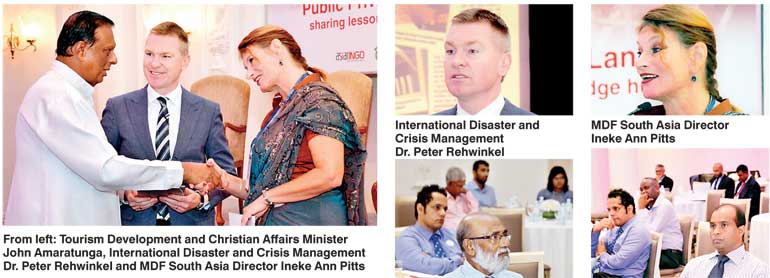Friday Feb 20, 2026
Friday Feb 20, 2026
Tuesday, 17 November 2015 00:57 - - {{hitsCtrl.values.hits}}
By Shiran Illanperuma
As heavy rainfall and flash floods batter the north and east regions of the island, affecting the livelihoods of over 37,000 people, the International Disaster Convention kicked off yesterday with its inaugural session.
The inaugural session focused on the theme of disaster resilience through public-private partnerships. Speaking on the issues was International Disaster and Crisis Management Director Dr. Peter Rehwinkel.
“In crisis management government organisations cannot manage everything on their own. The private sector possesses immense assets and knowledge and they may be exceedingly important during disasters,” he said.
Prime Minister Ranil Wickremesinghe, who was unable to attend, lauded the launch of the convention. “It (the convention) further generates a robust public-private dialogue towards the consolidation of disaster readiness methodologies in Sri Lanka,” he said.
Despite rural areas traditionally being the most vulnerable to disasters, Rehwinkle stresses that the rapid urbanisation of global communities means stronger disaster resilience in urban centres is needed.

“Cities are places where stresses build up and sudden shocks occur. Paris is an example of a sudden shock. And the result especially in poorer cities is economic deprivation, physical collapse or social breakdown,” he said.
Rehwinkle also championed decentralisation as a prerequisite for better disaster management. “Frameworks are needed to facilitate horizontal networks of collaborators. This, instead of top-down decision making, is perfect for building sustainable collaboration,” he said.
Originally slated to be held in Dubai, organisers MDF Asia decided to relocate the event to Colombo due to their pre-existing social networks on the island as well as the country’s immense experience in dealing with disaster scenarios both natural and manmade.
MDF South Asia Director Ineke Pitts said, “Sri Lanka has a wealth of knowledge, expertise and technology to mitigate disaster, yet experience has shown that there is still much to be learned and improved.” Organised in collaboration with the Ministry of Disaster Management, MDF describes the convention as a ‘pilot event’ with a view to expand on an annual basis, placing Colombo on the map as a knowledge hub for disaster management.
Pitts said, “Our vision in Sri Lanka is to make the country a centre for excellence and a knowledge hub on disaster, climate change and sustainability. We expect this to become an important annual event on the international development calendar.” Academics too agree that the island is well poised to function as a knowledge centre for disaster and development. “Sri Lanka is perfectly positioned to be a hub for disaster relief across the region. It is a role for which she is well equipped,” said Dr. Sinha Raja Tammita-Delgoda. According to statistics referenced by Tammita-Delgoda, nearly 50% of natural disasters occur around the Indian Ocean, placing Sri Lanka in the middle of a volatile region. With the dense area also supporting around 39% of the world’s population, disaster management is a vital endeavour.
Despite the modest gathering of private and public sector stakeholders at the fledgling convention, visitors hailed from regions across the globe including Bangladesh, Lebanon and parts of Africa.
Pix by Upul Abayasekara